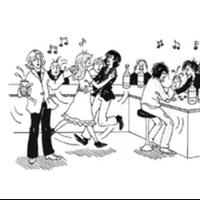Ĉapitro 1.2 – La unua renkonto
Kapitel 1.2 – Die erste Begegnung
Chapter 1.2 – The first encounter
Capítulo 1.2 – El primer encuentro
Capítulo 1.2 – O primeiro encontro
Глава 1.2 – Первая встреча
Ina: Kabe estas interesa nomo…
أنثى: Kabe اسم مثير للاهتمام ...
Ina: Kabe is an interesting name…
Mujer: Kabe es un nombre interesante ...
Ina: Kabe는 흥미로운 이름입니다…
Kabe: Ĉu?
كابي: صحيح؟
Kabe: right?
Kabe: ¿Verdad?
Kabe: C'est ça?
카베: 어?
En kiu maniero?
في أي طريق؟
In what way?
¿En qué manera?
De quelle manière?
어떤 방법으로?
Ina: Ĝi rilatas al Esperanto.
أنثى: إنها تتعلق بالاسبرانتو.
Female: It's related to Esperanto.
Femenino: Se relaciona con el esperanto.
Femelle: Cela concerne l'espéranto.
여성: 에스페란토와 관련이 있습니다.
Kabe: Kio?
كابي: ماذا؟
Kabe: What?
Kabe: ¿Qué?
Kabe: Quoi?
카베: 뭐?
Mi ne aŭdis bone.
لم اسمع جيدا.
I did not hear well.
No escuché bien.
Je n'ai pas bien entendu.
나는 잘 듣지 않았다.
La muziko estas tro laŭta.
الموسيقي عالية جدا.
The music is too loud.
La música está muy alta.
음악이 너무 큽니다.
Ina: Mi diris, ke via nomo rilatas al Esperanto.
أنثى: قلت إن اسمك مرتبط بالاسبرانتو.
Female: I said your name is related to Esperanto.
Voix de femme: J'ai dit que votre nom est lié à l'espéranto.
Ina: 나는 당신의 이름이 에스페란토와 관련이 있다고 말했습니다.
Kabe: Ĉu vere?
كابي: حقاً؟
Kabe: Is it really?
Kabe: Vraiment?
Tio estas novaĵo por mi.
هذه أخبار بالنسبة لي.
That's news for me.
C'est une nouvelle pour moi.
그것은 나에게 뉴스입니다.
Ina: Ĉu vi aŭdis pri Esperanto?
الأنثى: هل سمعت بالإسبرانتو؟
Female: Have you heard about Esperanto?
Femme: Avez-vous entendu parler de l'espéranto?
Ina: 에스페란토에 대해 들어보셨나요?
Kabe: Jes, sed mi ne sciis, ke mia nomo rilatas al ĝi… Fakte, kia estas la rilato?
كابي: نعم ، لكن لم أكن أعرف أن اسمي مرتبط به ... في الحقيقة ، ما هو الرابط؟
Kabe: Yeah, but I didn't know my name was related to it ... In fact, what is the relationship?
Kabe: Sí, pero no sabía que mi nombre estaba relacionado con eso ... De hecho, ¿cuál es la conexión?
Kabe: Oui, mais je ne savais pas que mon nom y était lié… En fait, quel est le lien?
Kabe: 네, 하지만 제 이름이 관련이 있다는 것을 몰랐습니다... 사실, 어떤 연관성이 있나요?
Ina: Ho, tio estas longa rakonto.
أنثى: أوه ، هذه قصة طويلة.
Ina: Oh, that's a long story.
Mujer: Oh, esa es una larga historia.
Mi rakontos al vi poste se vi volas.
سأخبرك لاحقًا إذا أردت.
I'll tell you later if you want.
Te lo cuento más tarde si quieres.
나중에 원하시면 말씀드리겠습니다.
En ĉi tiu loko estas tro da bruo.
يوجد الكثير من الضوضاء في هذا المكان.
In this place there is too much noise.
이 곳은 소음이 너무 많습니다.
Kabe: Jes, vi pravas.
كابي: نعم ، أنت على حق.
Kabe: Yes, you're right.
Kabe: Oui, tu as raison.
카베: 네, 맞습니다.
Ĉu ni dancu?
هل نرقص؟
Can we dance?
Allons-nous danser?
우리는 댄스?
Ina: Bona ideo!
أنثى: فكرة جيدة!

